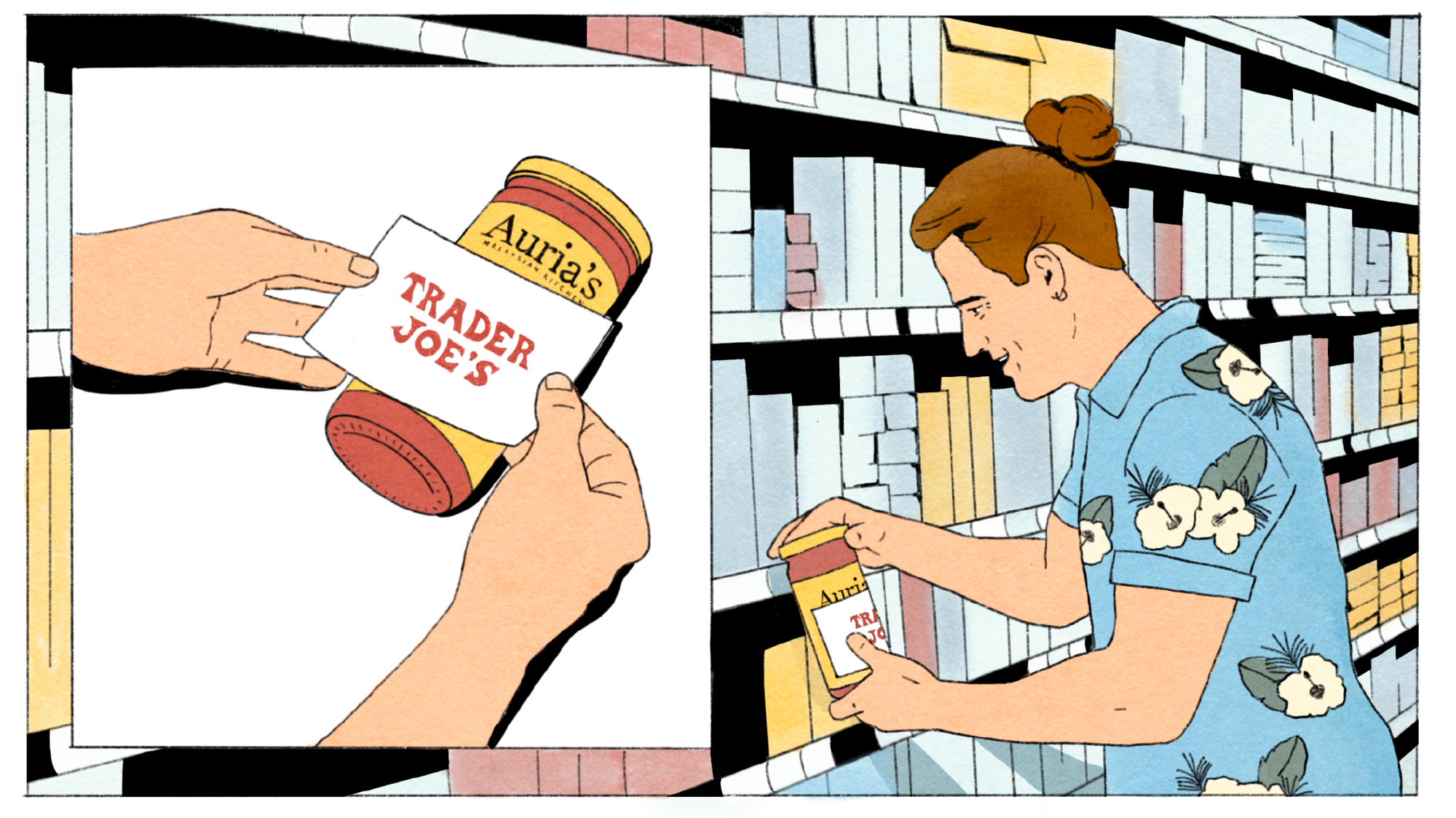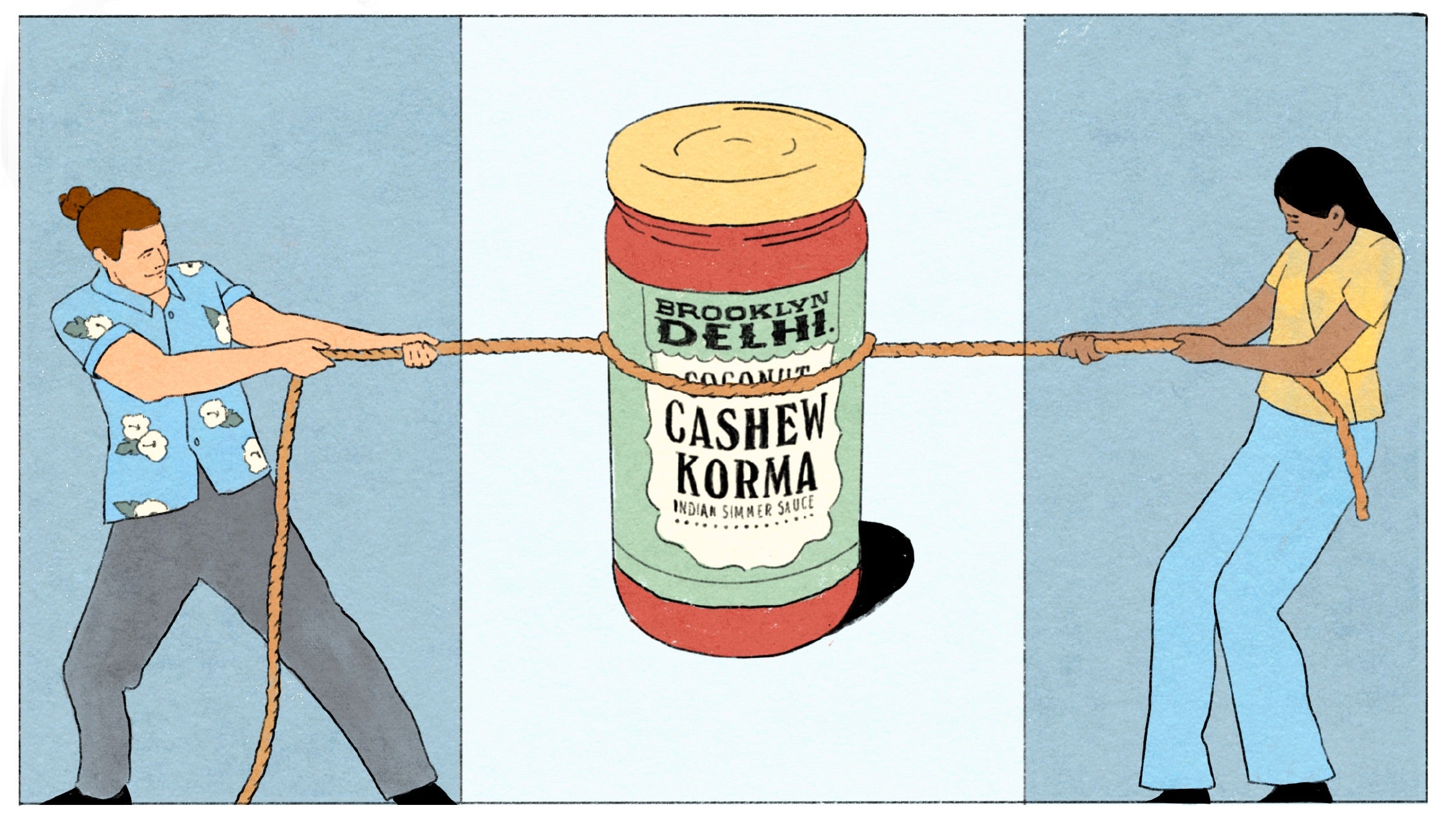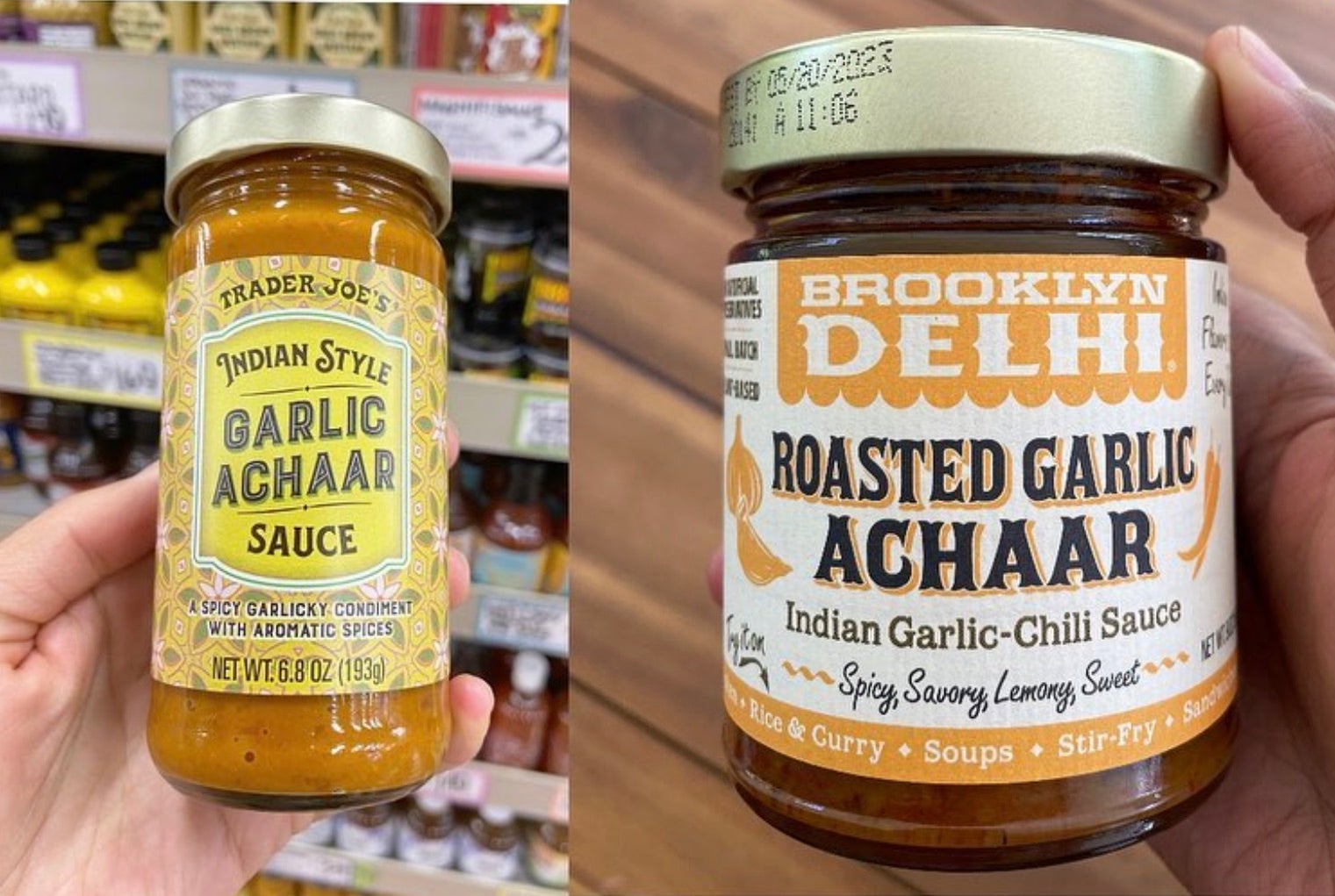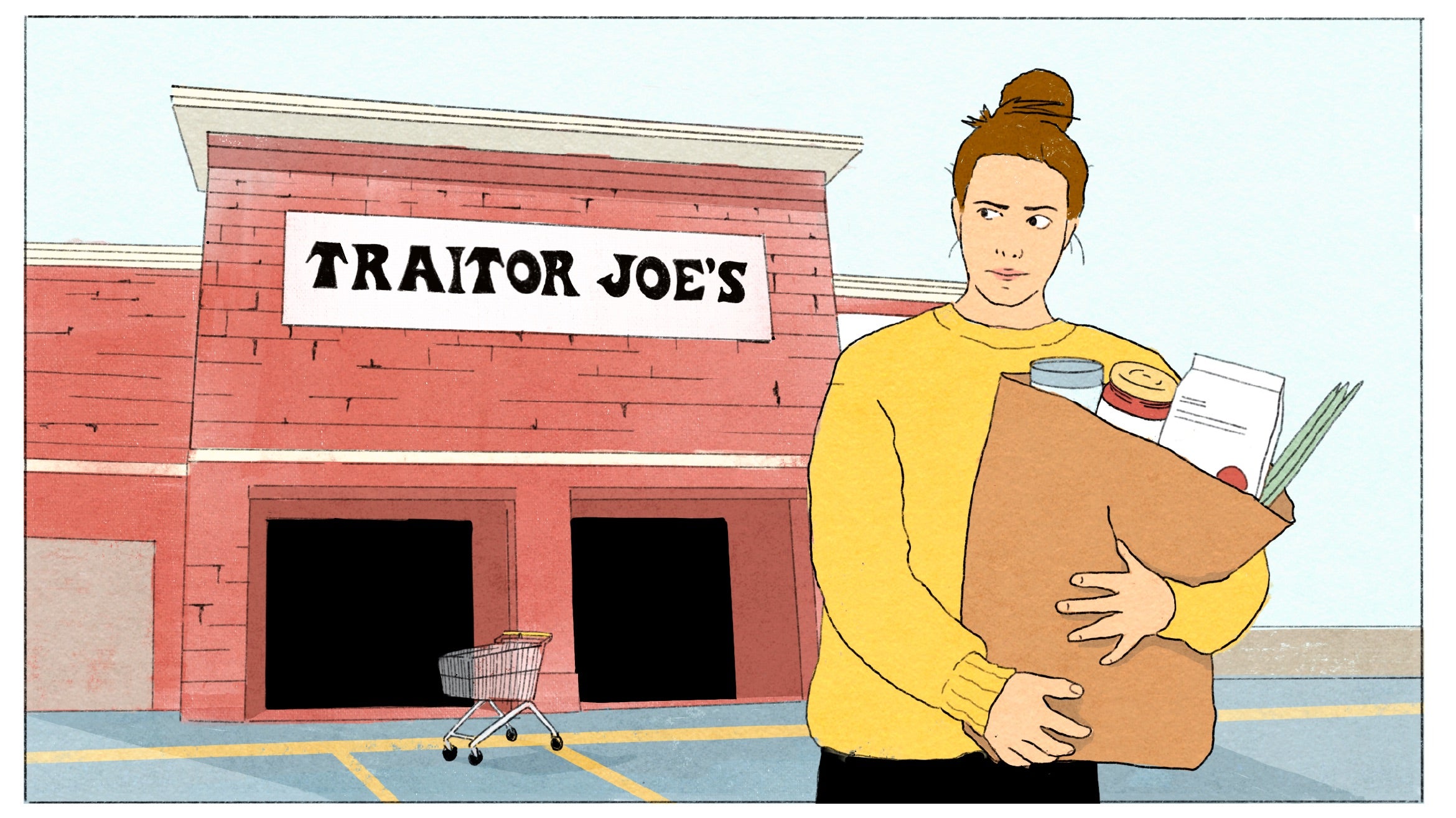
Behind the bubbly cashiers in Hawaiian shirts, craveable snacks, and bargain-basement prices are questionable business practices that have many food brands crying foul at the company’s blatant and aggressive copycat culture.
Chitra Agrawal doesn’t want to talk about Trader Joe’s anymore. She vividly remembers the deluge of direct messages she received from customers on her company’s social media accounts in the summer of 2021. Is this you guys? You got into Trader Joe’s?! The response was overwhelming—but also confusing. Brooklyn Delhi, the condiment company she’d founded in 2014 offering boldly flavored Indian pickles and chutneys, wasn’t sold at Trader Joe’s. But six months earlier, she’d been approached by Trader Joe’s executives about partnering together. “I felt like I’d been sucker punched a little bit,” Agrawal recalls. Earlier that year, she’d provided them with samples, including wholesale pricing for some of her signature products, like her Coconut Cashew Korma and Roasted Garlic Achaar. Then communication went dark. According to Agrawal, a food industry veteran with over 15 years of experience, it isn’t unusual for negotiations to go quiet when you’re engaged with a major retailer. What happened next was the unusual part.
Agrawal learned in August via messages from friends and social media followers that Trader Joe’s had launched its own proprietary garlic achar product with a similar set of ingredients and a similar label design to Brooklyn Delhi’s popular simmer sauces. Trader Joe’s even spelled its product’s name the same way—with three As (“achaar”), instead of using the traditional spelling which has only two (“achar”). (Agrawal intentionally chose to spell the word, which means “pickled” in Hindi, more phonetically to make the product easier to pronounce for non-Indian buyers.) Even though traditional achar is made with raw garlic, Trader Joe’s roasted the garlic in its formula (although in diluted, pureed form), mimicking the signature twist that makes Brooklyn Delhi’s product so unique.
Agrawal took to Instagram to set the record straight, clarifying that her company was not behind the watered-down Trader Joe’s version. Even though she understood that her company owned no rights to achar itself—recipes, after all, cannot be trademarked—she couldn’t shake the feeling that she’d just gotten played.

After six months of conversations with five founders of small to midsize food brands, it appears to be an open secret in the consumer packaged goods industry that Trader Joe’s outsources inspiration for new products by targeting emerging brands under the guise of recruiting them to manufacture private-label items. Private labeling is the ubiquitous (and often clandestine) practice of consumer food brands creating exclusive products for third-party retailers. The terms of these contracts vary, but the enlisted food brand typically receives compensation in the form of a production fee or profit-sharing arrangement.
According to these sources, Trader Joe’s commonly solicits product samples and even asks for potential recipe adjustments—a revealing and time-consuming exercise for bootstrapped founders—before inexplicably abandoning the negotiations and releasing its own private-label versions of similar products at lower prices.
“They’re specifically doing this to diversity brands, or so-called ethnic brands,” the founder of one gourmet food company told me on the condition of anonymity to avoid unwanted media attention. Before the COVID-19 pandemic, the New York–based founder had corresponded, through phone calls and emails, with the Trader Joe’s product team over the course of several months about private labeling two of his products, a spicy condiment and a jarred simmer sauce. “Ethnic foods are specialized items; there’s so much history and culture and tradition that you can’t do simple knockoffs like you do with everyday items like ketchup or mayo,” he said. “You need brands like ours to educate you.”
The Monrovia, California–based Trader Joe’s, which owns and operates 545 stores in 42 states plus Washington, DC, is a widely loved brand with a motivated fan base. Trader Joe’s aficionados regularly brave crowded stores and long lines to stock up on signature frozen meals, like its wildly popular Mandarin Orange Chicken and Cauliflower Gnocchi, as well as quirky private-label snacks like Peanut Butter Filled Pretzel Nuggets and Baked Cheese Crunchies. But behind the kitschy grocery chain’s public face, with its superficial good vibes and Hawaiian-shirted cashiers, is a litany of thorny ethics and questionable business practices surrounding how it handles sourcing and packaging certain private-label ethnic food products.

The original Trader Joe’s store opened in Pasadena, California, in 1967. Its founder, Joe Coulombe, sought to distinguish his eccentric, nautically themed grocery brand from the wave of convenience stores like 7-Eleven that were popping up all over the state at the time by offering a large, curated selection of reasonably priced gourmet foods, like hard-to-find wines and cheeses, from all over the world. The company struggled in its nascent years, but the breakthrough came in 1972 when Coulombe produced the store’s first private-label product, a proprietary granola that undercut the competition on price. Today about 85 percent of Trader Joe’s inventory is private label. “Keeping things in our label as opposed to the brand-name label or a supplier’s label helps us keep our costs low,” said Tara Miller, currently Trader Joe’s VP of marketing, on the Inside Trader Joe’s podcast in 2018.
An important aside: I occasionally buy food from Trader Joe’s. I understand the reality that, for many consumers, the store’s everyday low prices make it an appealing place to shop, especially as inflation soars to historic levels and grocery prices have risen 25 percent over the past four years alone. Last week, even Trader Joe’s announced it was raising its price on individual bananas from 19 cents to 23 cents—the company’s first price hike in over 20 years. Compared with other national grocery chains like Whole Foods, Trader Joe’s is still a significantly cheaper source for many pantry staples and other basics like cereal and eggs. This holds true even when comparing private-label items—I recently found a five-pound bag of organic all-purpose flour selling for $8.69 at Whole Foods (365 brand), compared to $4.99 at my local Trader Joe’s. The store’s well-curated selection of convenience foods, particularly those found in the frozen food aisle, comprises a relative United Nations of cuisines from around the globe, tailor-made for the air fryer economy.
“It’s an affordable grocery store for gourmet or gourmet-leaning items, depending on how you define ‘gourmet,’” says Alex Beggs, who reviews Trader Joe’s products in a seasonal online column for Bon Appétit. Beggs, herself an avid Trader Joe’s shopper and occasional TASTE contributor, offers candid takes on new product releases, helping readers separate the hits from the misses. “It’s a grocery store, but it’s full of little treats, and we love treats as a species,” she says.
She couldn’t shake the feeling that she’d just gotten played.
Private labeling has been instrumental to Trader Joe’s growing success. “It made private label feel not private label,” says Andrea Hernández, an erudite observer of the snack food and grocery space in her popular Snaxshot newsletter. “So it still felt like a discovery, as opposed to [house-brand products like] 365 at Whole Foods or Kirkland at Costco, which are packaged very generically.” According to Hernández, Trader Joe’s branding has a unique appeal for millennial and Gen Z consumers who gravitate toward product “dupes”—private-label items that are indistinguishable from the name brands—that make them feel like they’re hacking the grocery aisle. “All the articles about Trader Joe’s from a millennial lens talk about dupes,” she says. “The rebranding of private label as a budget hack resonates with our generation.”
The ethnic food aisle is not the only victim of Trader Joe’s product duping; its stores are filled with private-label spins on many mainstream corporate snack foods, too. Ritz Crackers are rebranded as Golden Rounds, Oreos are called Joe-Joe’s, and Pringles are repackaged as Sea-Salted Saddle Potato Crisps. In fact, many large corporations like Pepsi and Conagra are suspected of cooperating with Trader Joe’s to manufacture cheaper versions of their own products for private labeling.
But Trader Joe’s hijacking the ethnic food aisle and flooding the market with cheap knockoffs is more frustrating to so-called baby brands like Brooklyn Delhi, who feel like they’ve created niche lanes for certain products that didn’t exist before. Unlike large conglomerates, smaller brands often can’t scale production to meet the price demands associated with private labeling for large retail companies. For them, the Trader Joe’s dupes are capitalizing on their years of product development and marketing. “After I posted on social media,” Agrawal says, “a number of other food brands started messaging me and saying they’d had similar experiences with Trader Joe’s. Apparently it’s a known thing among food artisans.”
In the summer of 2019, more than a year before Agrawal was first approached by Trader Joe’s, Auria Abraham of Auria’s Malaysian Kitchen received an email from a “product innovator” with an official Trader Joe’s email address about private labeling her Lime Leaf Sambal for nationwide distribution in its stores. “When you get that email, it’s like, ‘Wow! Is this going to blow the top off my business?’ In a good way,” she says. According to Abraham, the parameters of the deal required her to partner with a specific co-packer (a third party that handles the manufacturing) based in California. Abraham exchanged several calls and emails with the co-packer in late 2019, but the financial terms were onerous, leaving Abraham feeling uneasy about a potential partnership. In return for private labeling her product for Trader Joe’s, she was told she would receive a modest finder’s fee based on the co-packer’s profits—not a percentage of Trader Joe’s sales.
After sharing samples with the co-packer and sending a counteroffer asking for greater transparency, she never heard back from him or from Trader Joe’s. Within a matter of months, Trader Joe’s released a product with a similar recipe and flavor profile that it called Thai-Style Green Chili Sauce. Its sauce was also made with jalapeño and Auria’s signature sambal ingredient, makrut lime leaves (Trader Joe’s labeled them as “Thai lime leaves” on its product’s jar).

The company is notoriously tight-lipped about its private labeling process. Responding to a request for comment about the allegations of copycatting alleged by multiple sources in this article, a Trader Joe’s spokesperson wrote: “When we develop our products, we meet with many potential producers to determine which can best deliver on food safety, production capacity, product quality, and price. We are proud of our long history of supporting vendors and their growth with us. For a range of reasons, we are unable to work with every company we contact and realize our decisions to not pursue certain products can be disappointing.”
But the founders I spoke to, who share years of extensive experience collaborating with other major food retailers, including companies that also offer private label products in their stores like Costco, Target, and Whole Foods, all described Trader Joe’s shadowy tactics as an outlier in the industry. They’re left wondering whether Trader Joe’s negotiates with prospective partners in good faith.
Beyond emulating recipes, Trader Joe’s also has a reputation for shamelessly copying the package designs of established products in the ethnic food space. One founder of a popular ethnic food brand told me, on the condition of anonymity due to a non-disclosure agreement, that their company threatened legal action against Trader Joe’s in 2019 for infringing on trademarked packaging design. “Their product line looked incredibly similar to ours in terms of color choices, patterns, borders, and font,” they recall. “It was kind of uncanny.” The founder, whose products are sold in over 15,000 stores across the United States, initially shrugged it off, but as the confusion grew among their clientele base, they decided to lawyer up. Trader Joe’s eventually capitulated without the founder bringing suit, agreeing to make minor cosmetic changes to its packaging, including altering label motifs and adjusting the color scheme slightly.
“It reminds me of the fast fashion model,” says Jing Gao, who founded the wildly popular Fly By Jing brand of Sichuan chili crisp. “Trader Joe’s is like the food version of Zara or Shein. The way that these big houses keep up with so much innovation so quickly is by copying independent designers.” Trader Joe’s executives approached Gao about private labeling at Natural Products Expo West in 2022. According to Gao, a company representative told her, referring to her popular chili crisp, “We’ve been trying to replicate this flavor, and we can’t get it right.” Gao made it clear that she would only consider partnering with the company if it was also willing to carry her Fly By Jing brand in its stores. That turned out to be a dealbreaker, ending the conversation on the spot.
Last year, Fly By Jing collaborated with another baby brand, Little Sesame, to release a limited-edition hummus topped with Fly By Jing’s chili crisp. They launched the product to great fanfare at Expo West in early 2023, where Trader Joe’s product innovators are known to roam the aisles of the Anaheim Convention Center. About three months after the event, Trader Joe’s released a similar hummus product with its own proprietary chili crisp for less than half the price. “With food, just like with fashion, whenever something is cheap, somewhere along the line, someone is being taken advantage of,” says Gao. “As with Zara and Shein, they sniff out the latest trends and replicate them quickly and cheaply. Those companies specifically target young, up-and-coming designers because they know they won’t get called out for it.”
Unlike other companies that innovate by creating new products and product categories, Trader Joe’s recipe for innovation relies on harvesting knowledge and expertise from third party vendors to bring existing products under the Trader Joe’s banner. Co-opting the ideas of established artisans, whether those brands end up as partners or not, seems baked into its product development methodology, a tactic that the company justifies as part of its crusade to provide customers with more affordable groceries. “You can have a fantastic product, that everybody knows is fantastic, but it doesn’t belong at Trader Joe’s because the value just isn’t there,” said Lori Latta, Trader Joe’s VP of Product Innovation, during an interview on PLMA Live. “And if we find products like that, we do everything we can to either find another source for something similar—we’re not copying other people’s things—or we work with suppliers to make those prices more reasonable. But if it’s not great value, we don’t bring it in.”
But the unnamed New York–based founder I spoke to believes that Trader Joe’s hides behind price to sandbag negotiations with small brands. Less than six months after it approached his company about private labeling, Trader Joe’s released not one but two jarred condiments similar to his. He had sent them multiple samples of both. “They give you a price point that they know you can’t meet, so you gracefully bow out. That gives them the legitimate green light to knock you off,” he said. “And then a couple of months later, they launch the same products.”
“They could be showcasing the actual people that are making this stuff. Instead of cutting corners and finding cheap ways to make it, then taking credit by calling it ‘Trader José’ or whatever. That’s a colonial mindset.”
To his point, most of Trader Joe’s private-label products are priced so low that baby brands can’t meet the company’s wholesale price requirements. Abraham says that had she private labeled her Lime Leaf Sambal with Trader Joe’s using the original recipe, her wholesale unit cost to them would’ve been around $7. The Thai-Style Green Chili Sauce that the company released after their negotiations stalled went on sale for a mere $2.99, a sweet spot for many of Trader Joe’s ethnic food products. In other words, it would be impossible for her company to manufacture a product that could meet Trader Joe’s price targets without compromising quality. (Trader Joe’s did not respond to our repeated attempts to verify the details of its correspondence with the company founders we interviewed and refused to answer pointed questions regarding the allegations outlined in this article.)
Copycatting baby brands is not the only controversy related to ethnic food labels that has embroiled Trader Joe’s in recent years. In 2020, the company faced public outcry over the store’s racially insensitive packaging, such as private-label brands like Trader José beer and Trader Ming’s frozen Asian meals. The company initially sounded contrite on the issue, but it later refused to change many of its product names, arguing that it did not believe the labels were racist. On a recent visit to a location in New York City’s Upper East Side neighborhood, I found both Trader José and Trader Ming’s products currently on sale. (Trader Joe’s ignored multiple requests for comment regarding the accusations of racially insensitive packaging and refused to provide specific details about which, if any, labels had been discontinued.)
The beachcomber ethos of Trader Joe’s evokes the tiki aesthetic that some believe inspired Coulombe, a self-professed admirer of the iconic California tiki bar Trader Vic’s, to name his store after it. But just as the tiki cocktail movement has had its own reckoning with cultural appropriation, the exoticism at the heart of Trader Joe’s feels less charming today than when the company was founded—especially against the backdrop of blatant copying from minority-owned brands. “The whole business model of Trader Joe’s is based on racial insensitivity,” says Preeti Mistry, a California-based chef and author of The Juhu Beach Club Cookbook. “It’s called ‘Trader Joe’s.’ It’s basically a white guy named Joe who travels the world and brings these delicious foods to your neighborhood.”
A common feeling among the purveyors I spoke with for this article is that Trader Joe’s is squandering the opportunity to shine a light on small brands, especially ones with unique global flavors like Brooklyn Delhi and Fly By Jing. “They could be showcasing the actual people that are making this stuff,” says Gao, “instead of cutting corners and finding cheap ways to make it, then taking credit by calling it ‘Trader José’ or whatever. That’s a colonial mindset.” Gao and others agree that Trader Joe’s duping ethnic brands makes it more difficult for them to introduce the public to new product categories when they have to contend with Trader Joe’s undermining their efforts with watered-down versions of the same products. “We’re building a category and educating people about what this is,” says Gao. “To have that opportunity be taken from you as a small brand is pretty shitty.”
In 2022, two years after Trader Joe’s abandoned negotiations with Abraham, a new point of contact on the product innovation team reached out to her about partnering together, expressing interest in several of Auria’s products, including her Salted Caramel Kaya. By then, Abraham had caught wind of what happened to Brooklyn Delhi, and she was not willing to travel that road again. “Perhaps now would be a good time for Trader Joe’s to put our brand on your shelves under our own label to show that Trader Joe’s supports small businesses,” Abraham wrote back in an email she shared. The 12-word response was clear: “Thanks for the suggestion, but we are only interested in private label.” That was the last contact Abraham has had with anyone from the company.
There is little optimism among my many sources that Trader Joe’s tactics will change anytime soon, especially when affinity for the brand has never been higher, and the company’s rabid fans remain addicted to their weekly TJ’s runs. “There’s always going to be a place for Trader Joe’s because of the fucked-up fact that people don’t have any time or money,” says Mistry, “and that’s just getting worse.” Rising grocery prices make the value proposition of shopping at a place like Trader Joe’s even more attractive. But small food brands are determined not to let corporate bullies break their independent spirit. For most of them, like Agrawal’s Brooklyn Delhi, it still feels like an uphill battle. “The only way it’s going to change is if consumers do something about it,” she says. “But if they keep wanting the same cheap knockoff products, then Trader Joe’s is going to keep peddling them out.”